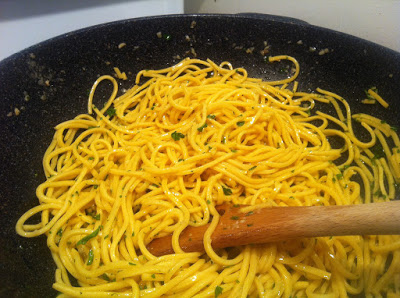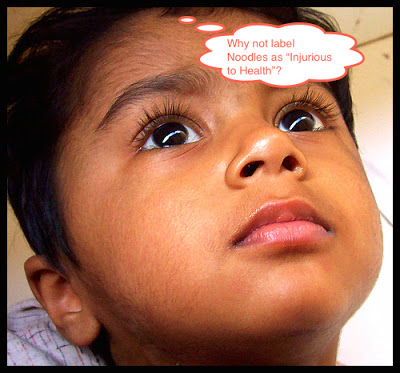Who doesn’t love noodles? Nestle’s Maggi Instant noodles has been ruling the Indian market for almost 30 years now and the word “Maggi” has become the synonym of noodles in the Indian kitchens. It is popular among the children as well as the adults all around the country. But when the Food Safety and Standards Authority of India accused Nestle’s Maggi of failing to comply with the food safety laws of the country and announced a nation wide ban of the product, some eyebrows were raised for sure. So what is wrong with Maggi noodles? Is the problem confined to Maggi alone? Let’s take a look at the truth which is hard to digest!
 |
| Image Credit – Becky Berry |
Lead was found in some of the packets in amounts significantly higher than the allowed maximum limit. Lead intoxication in humans is a dangerous thing and that is why the Food Regulator of India has declared Maggi products as unsafe and hazardous. In addition to Lead, Mono Sodium Glutamate (MSG) or more commonly known as Ajinomoto was also found in a higher concentration in the test samples of noodles market leader.
Lead is a heavy metal which is widely used in many industries because of it’s unique properties like low boiling point, ease of oxidisation, anti corrosive property and alloy forming properties. Lead contamination of our environment usually happens from paints, degraded plumbing materials, lead batteries and until 2000, in leaded fuel. Out of these main sources, paints are the most notorious ones which contributes to maximum contamination. One of the main reason behind this is the poor laws and reinforcements prevalent in India in the paint industry. There is no mandatory standards for the use of lead in paints. Lead exposure may occur through drinking water from lead pipe, chewing lead paint on window sills or painted toys (in case of children).
Noodles is made from flour and the water which is used to wash the flour could be contaminated with lead. Nestle does not manufacture the plastic wrapper in which the Noodle block is packed. The quality of the plastic wrapper could be poor as there are not sufficient mandatory rules for the production and use of plastic products in India. Lead contamination from the machinery is also a possible route on how lead found it’s way into the favourite dish of millions of children.
Lead contamination is not just confined to noodles. We are living in an environment which has all the above mentioned sources of lead in abundance. Even our drinking water could be contaminated. Fast food habits and beverages are just another source for lead poisoning, but not the major ones unless you consume it everyday.
What you need to know about Lead poisoning
Lead poisoning is a notifiable and compensatable disease in India since 1924. A normal adult ingests about 0.2 to 0.3 mg of lead per day. Most of the ingested lead is excreted through faeces. The remaining lead which is absorbed from the gut mainly enters the red blood cells from where it is then transported to liver and kidneys, brain and finally to bones. Excess amount of lead in our bodies can affect our health in many ways.
Lead accumulates in the human body mostly in the bones and teeth and are released into other organs through blood when diseases affecting the bones results in demineralisation. Lead is also mobilised from the bones in pregnancy and thus can affect the developing foetus.
The symptoms of lead poisoning are as follows :
Inorganic lead poisoning can cause abdominal pain, constipation, loss of appetite, blue line on the gums, anaemia, wrist and foot drop.
Organic lead poisoning affects the Nervous system resulting in Insomnia (sleeplessness), headache, mental confusion etc.
Hypertension and kidney disease including kidney failure are also related to long term human lead exposure.
Children and pregnant women are at higher risk of lead poisoning. According to the World Health Organization, about 600000 children with childhood history of lead exposure have been reported to develop ineffectual disabilities every year. Mental retardation and behavioural abnormalities like low intelligence quotient (IQ) and decreased span of attention are also related to lead intoxication in children. High doses of lead in children can directly affect the brain and result in convulsions, coma and even death. Porphyria is another disease which happens due to lead intoxication in children.
There is no known level of lead exposure which is considered safe for the humans. That means the lead which you have already consumed can be considered dangerous. There are blood and urine tests to determine the level of lead in human body and some chelative therapies can also help in removing lead from our body if it is detected at an early stage.
What about Mono Sodium Glutamate?
Mono sodium glutamate is a sodium salt of glutamic acid which is one of the most abundant naturally occurring nonessential amino acids. MSG or commonly known as Ajinomoto (brand name) is used as a flavour and taste enhancing agent in the food industry. It can be used as a seasoning agent in many snacks and is found in the small ‘masala’ sachet which comes with the noodles packet. MSG has been found safe in humans only if it is consumed at customary levels. No relation has yet been found between MSG and chronic diseases. But the issue with Maggi noodles is that MSG was found in packets of noodles which were labeled as “No Added MSG” and at levels which were higher than the normal concentration used.
Finally, Is Noodles Safe?
One thing you should learn from this article is that noodles (whatever brand it may be) is not the biggest source of lead poisoning in the world. Leaded fuel and leaded paints continue to be the main sources of lead contamination of our environment. Lead somehow got into some packets of noodles and the spotlight is now on Maggi. It is the duty of the Government to make strict rules in paint industry and to enforce them in such a manner that the health of it’s citizens is not jeopardised. If lead contamination can occur in a reputed company’s product like Maggi, it is hard to imagine the scenario in other small scale food industries which are flourishing in India at a very rapid rate. So noodles is safe indeed provided, you make your own noodles. And if you are living in India and want to have noodles badly and don’t know how to make it, import it from a country where strict food safety measures are being followed.
 |
| Image Credit – Nisha A |
Lead exposure has been estimated to account for the deaths of about 143000 persons in the world every year, the maximum burden of which is borne by the developing countries, and the funny thing about lead poisoning is that it can be prevented!